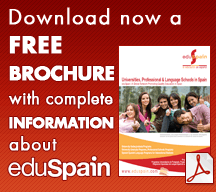Home > Study in Spain > Requirements & Visas
Requirements & Visas
Access to Spanish University
- With Previous University Experience
- Without Experience
- Translation of Documents
With Previous University Experience
Whether to continue undergraduate studies or start a postgraduate degree
The student must authenticate their qualifications, study program etc. No authentication is needed for documents sent from member states of the E.U or signatories in agreement with the EHEA:
Austria, Belgium, Bulgaria, Cyprus, Czech Republic, Denmark, Estonia, Finland, France, Germany, Greece, Holland, Hungary, Iceland, Ireland, Italy, Latonia, Lithuania, Liechtenstein, Luxembourg, Malta, Norway, Poland, Portugal, Romania, Slovakia, Slovenia, Spain, Sweden, United Kingdom. Also Switzerland with a bilateral EU agreement.
In other cases, the documents that are sent abroad for this purpose must be duly authenticated in accordance with the following conditions:
Documents sent from countries that have signed the Hague Convention (5th October 1961): Legalization or notarization sent by the countries official authorities will be sufficient
Alongside the countries of the EHEA, the following countries are also included: Andorra, Antigua and Barbados, Argentina, Armenia, Australia, Azerbaijan, Bahamas, Barbados, Belize, Belorussia, Bosnia-Herzegovina, Botswana, Brunei Darussalam, Cyprus, Colombia, Cook Islands, Croatia, Czech Republic, Dominica, Ecuador, El Salvador, Estonia, Federation of Russia, Fiji, Granada, Honduras, Hong Kong, Hungary, Israel, Japan, Kazakhstan, Lesotho, Liberia, Macao, Malawi, Malta, Marshall Islands, Mauritius Islands, Mexico, Monaco, Montenegro, Namibia, New Zealand, Niue Island, Old Yugoslavian Republic of Macedonia, Panama, Puerto Rico, San Vicente and the Grenadines, San Cristobal and Nieves, San Marion, Santa Lucia, Serbia, Seychelles, Slovenia, Switzerland, South Africa, Surinam, Swaziland, Tonga, Trinidad and Tobago, Turkey, Ukraine, United States of America, Venezuela, West Samoa.Extensions: Netherlands (Dutch Antilles, Aruba), United Kingdom (Anguilla, Jersey, Guernsey, Isle of Man, Bermuda, British Antarctic Territory, Caiman Islands, Falkland Islands, Gibraltar, Montserrat, Santa Elena, Turkish and Caicos Islands, Virgin Islands).
Documents sent by countries that have signed the Andrés Bello Convention (Article 2, Appendix 6. Resolution 006/98, approved by the XIX Meeting of the Andres Bello Convention's Education Ministries (Whenever the country has also signed the Hague Convention the simpler above option can be used). They must present themselves in:
- Ministry of Education of the country of origin for qualifications and proof of study and the corresponding Ministry for birth and nationality certificates.
- Ministry of Foreign Affairs from the country which sent the said documents.
- Diplomatic representative or Spanish consulate in said country. Bolivia, Colombia, Cuba, Chile, Ecuador, Panama, Paraguay, Peru, Spain and Venezuela.
Documents sent by other countries: these will have to be legalized through a diplomatic route. They should present themselves in:
- Ministry of Education of the country of origin for qualifications and proof of study and the corresponding Ministry for birth and nationality certificates.
- Ministry of Foreign Affairs from the country which sent the said documents.
- Diplomatic representative or Spanish consulate in said country.
Documents sent by diplomatic authorities or consulates from other countries must be legalized in Spain in the Spanish Ministry of Foreign Affairs.
Without Previous University Experience
To begin first year studies in a Spanish University
If the student is an E.U nationalor belongs to one of the states that has signed International Agreements to that respect: The student will not have to take the University Entrance Exam to gain access to Spanish University, he/she will have to authenticate the certification of the University Entrance exam from their country of origin, following the rules and directions set out previously for the authentication of University qualifications, so that afterwards we can begin the process of standardization of the same documents via the National University of Distance Education in Spain, and in this way (over a period of approximately 3 months) then receive the mark obtained according to the Spanish education system and bearing in mind the following equivalents between education systems:
Select country.
All other nationalities
Will be required to take the University Entrance Exam (PAU). At eduSpain we offer you our Foundation course (link to the course with dates and prices) at the end of which this exam will take place.
- Request a study visa from the Spanish Embassy or Consulate in your country for the length of the program of study. eduSpain or the actual University where you will carry out your studies will provide you with the invitation to such an effect.
- When you are satisfied with what you have chosen, you will have to confirm that eduSpain can go ahead with the admission application and pre-matriculation process for the chosen course. In order to do this, some courses and centres require a reservation fee. If this is the case, eduSpain will explain to you how to do it. You must bear in mind that even at this point there is no complete guarantee that you will get a place on the course.
- If you are accepted on to the course you will have to pay the fees corresponding to that course within a certain deadline, as well as anything else that the corresponding centre of studies requires. An eduSpain consultant will explain to you how to do this.
- Prepare your journey and ask eduSpain for any services that you require once you arrive in Spain: airport pick-up service and transport to accommodation, medical insurance etc.
Translation of documents sent from abroad
Article 36.1 of the Law 30/1992, 26 November, from the Legal Procedure of Public Administration and the Common Administrative Process, states that the language of the proceedings organized by the State General Administration will be Castilian. In keeping with this, the rules regulated by these processes demand that the documents sent from abroad which need to be used, are accompanied by an official translation in Castilian (when they are not already being sent in this language).
The official translation can be done by:
- An official translator duly authorized or registered in Spain.
- Any Spanish State diplomatic representation or consulate abroad.
- Diplomatic representation or Spanish consulate in the country in which the applicant is a citizen, or, in other cases, the country that the document has come from.
As far as possible, when the original document is not written with the western alphabet, it is recommended that the corresponding translation keeps the denomination of the qualification in its original language, but written in western alphabet, instead of a translation of that denomination.

